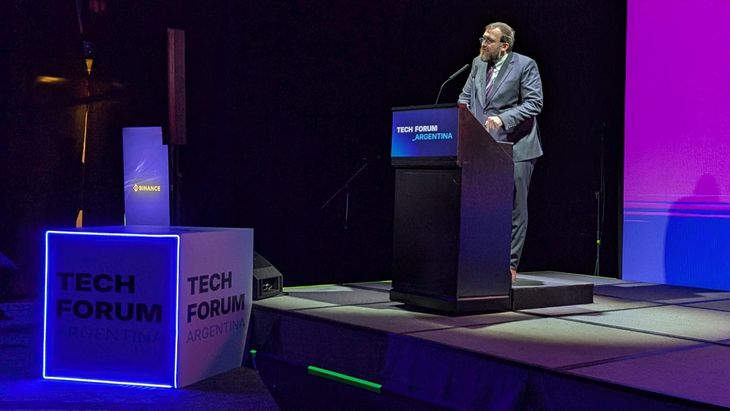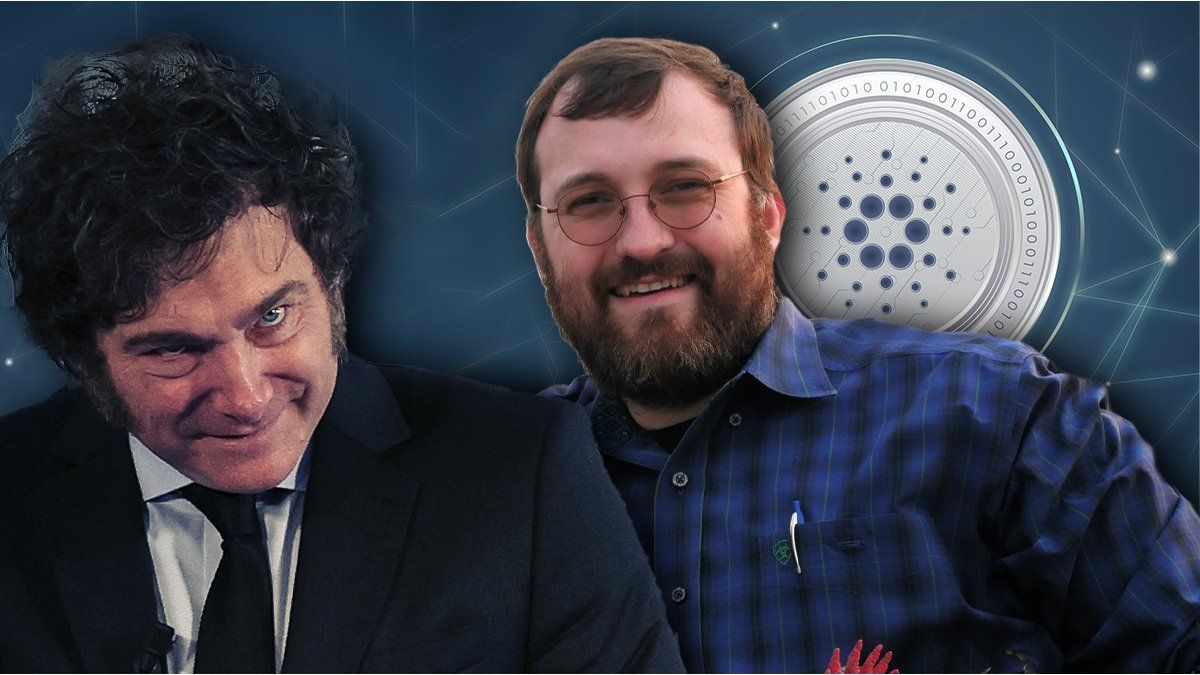An innate liberal, like Blockchain
Journalist: What is the similarity between liberalism, Blockchain and where would you put Javier Milei in this decentralized scenario?
Charles Hoskinson: Milei has a vision that is closely aligned with some of the core principles of our industry, such as the concept of private, solid currencies and privately managed services. However, the great challenge of liberalism is its implementation. While it proposes a balance between the government and the private sector, there is a reason why those governments exist: private industry also has its limitations. This is where Blockchain is presented as a third way, which does not belong entirely to the government or private industry, but rather acts as a bridge between the two. Sometimes it behaves like a government entity, and other times, like a private actor. This makes it an ideal solution for issues such as voting systems, national identification or central bank functions. I believe that as Milei deepens his knowledge in that field, he will recognize three key points: first, which Blockchain is highly compatible with his philosophy; second, that Argentina is already a global leader in cryptocurrencies; and third, that the country has enormous local talent to promote and execute these initiatives.
Q: How could blockchain boost the Argentine economy?
CH: Blockchain in Argentina can act as a bridge between the formal and informal economy. In a country where many earn in pesos, but save in dollars, a large part of these transactions are carried out in the parallel economy, making their management difficult. Blockchain could unify both systems, offering transparency and auditability. This would allow the government to obtain accurate economic data on inflation and the real difficulties of citizens, thus improving the relationship between the government and society. Blockchain can also restore transparency and the rule of law in Argentina, attracting foreign investment by offering guarantees of legal protection and compliance, something that currently generates distrust. This could boost the Gross Domestic Product (GDP) by 10-15% annually, improving the country’s economy.
Q: In this regard, do you have plans to invest in Argentina?
CH: Yes. Now we work with Globant, we signed a Memorandum of Understanding with them and we plan to hire local developers for our projects. Additionally, we are interested in exploring the microfinance market, especially for the poorest 20 to 30% of the population in Argentina, who currently depend on short-term loans with abusive interest rates. We have already implemented similar products in Kenya, under the name RealFi, and we would like to bring this experience to this country. However, before launching these products, we need to familiarize ourselves with local regulations. Once this is done, we will evaluate the possibility of introducing these solutions here.
Q: What is the link with Globant?
CH: Us We see Argentina as a great place to hire people and build relationships. It’s also a wonderful market to test products like our wallet software, identity software and microfinance platform. Some of the first developers working on Cardano in 2016 were from Buenos Aires. That relationship led us to Globant.
MOU Signed between IOG and Globant.jpeg
Q: What is your opinion about central bank digital currencies (CBDC), especially in Argentina?
CH: We have been researching CBDCs for over 10 years. One of my first projects in the cryptocurrency space was an algorithmic stablecoin called BitShares. Today we are collaborating with the state of Wyoming on an asset-backed stablecoin, which resembles a CBDC. However, I don’t think the Milei administration is philosophically aligned with the idea of a central bank digital currency. Milei supports private currencies and monetary competition. Personally, I align with that philosophy and believe that cryptocurrencies fit well into Milei’s vision. These offer freedom of choice, and in Argentina there is already a strong consumer preference for private money, with $100 billion in crypto in circulation.
On regulation, Blockchain and Vitalik Buterin
Q: Why does Argentina attract so many big players in the crypto industry? What seduces them?
CH: In Argentina, Distrust in local currencies has led people to look for alternatives, such as asset-backed stablecoinslike Tether, to protect against inflation. This allows them to participate in a global economy that was previously out of their reach. Argentines are adopting decentralized finance (DeFi) and learning about yield farming, NFTs, metaverses and GameFi, similar to what is happening in countries like Nigeria and Vietnam. This trend will continue, as the alternative is to face high inflation, capital controls and trade barriers. Cryptocurrencies are acting as a form of foreign investment in Argentina, with local projects funded by investors from Europe, the US and Asia, injecting money into the economy.
Q: Are you for or against the regulation of the crypto industry, how does this contradict the decentralized spirit with which cryptocurrencies were born?
CH: Regulation needs to be updated and modernized, similar to how we adapt to technological evolution. An algorithmic approach should be implemented using smart contracts, which would eliminate ambiguities and reduce compliance costs. Currently, the regulatory burden falls on the private sector, creating inefficiencies and high costs, especially for smaller companies. It is crucial to understand the context in which regulation is used, as it often benefits powerful corporations more than consumers. I propose minimal and considered regulation, supported by free market mechanisms and self-regulatory organizations, that encourage companies to report improper practices. By aligning incentives, the industry can become healthier, where problems are detected by internal actors before regulators.
Q: Did the government consult you or consider your opinion on the regulation?
CH: I’ve had some questions about it. The objective is to organize the private and public sector in Argentina in a document focused on digital transformation, recognizing the interconnection between technologies such as Blockchain, AI, IoT, SaaS products and digital governance. By visualizing the citizen experience, the necessary technologies can be identified, with Blockchain as the backbone, guaranteeing reliable, complete, irreversible and secure systems. This would make it possible to resist manipulations, such as those by external actors or corrupt politicians, in the case of significant discoveries, such as lithium. The next step is to form a coalition that includes multiple political parties and private companieswhich would ensure the durability of the system beyond leadership changes. I have been in dialogue with members of the government and the private sector to assess their readiness towards this transformation. As a foreigner, I bring a different perspective on the priorities of the Argentine people, who must define their needs and their relationship with the government. Once clear, we can develop scopes of work and requests for proposals to bring together the actors needed to implement these ideas.
Tech Forum Argentina 2.jpeg

Q: You said in an interview that Ethereum is like a dictatorship. Are you on bad terms with Vitalik, or do you disagree with the direction the Ethereum network is taking?
CH: This is a clear example of how complex discussions are simplified into simple sentences. By referring to Vitalik as a “dictator”, I did not mean to imply that he runs Ethereum in an authoritarian manner, but rather that if you own Ether or Bitcoin, you have no say in the direction of the protocol. Although ETH presents itself as an open source project, network effects make real competition difficult. Although you could invest in developing your own ETH client, you would only add another member to the small group of decision makers, while the majority of Ether holders lack influence on the project roadmap and are dependent on Vitalik. and his close circle. As Ethereum grows, this governance model becomes unsustainable as disagreements with Vitalik’s decisions will arise. Ethereum could end up like Bitcoin, where innovation stagnates, or it will need to adopt a more inclusive governance model. Although Vitalik has shown resistance to on-chain governance, he appears to be recognizing that this stance can be problematic. Most modern Blockchain projects, such as Cardano, are exploring on-chain governance models.
Q: Since you mention Bitcoin, what is your projection for BTC after the US elections?
CH: Now that BlackRock is backing Bitcoin, it’s hard to imagine a drop in its value. BlackRock tends to succeed due to its extensive control, which makes me more optimistic about BTC’s ability to maintain its value. If the price of Bitcoin increases, it is likely due to speculative momentum. I wouldn’t be surprised to see Bitcoin reach between $200,000 and $300,000 next year. However, it is important to note that BTC usually follows stock market trends, which surprises me as I initially expected them to be countercyclical. It will be interesting to see if this trend continues. Political changes, especially those favorable to cryptocurrencies, such as the possible re-election of Donald Trump, could also encourage institutional adoption and raise prices.
Source: Ambito
David William is a talented author who has made a name for himself in the world of writing. He is a professional author who writes on a wide range of topics, from general interest to opinion news. David is currently working as a writer at 24 hours worlds where he brings his unique perspective and in-depth research to his articles, making them both informative and engaging.




